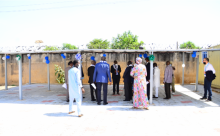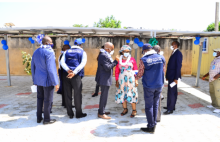WHO delivers solar panels to accredited polio laboratory in Borno State
Maiduguri, 12 November, 2021 - In Maiduguri, Borno state, the World Health Organization Country Representative, Dr Walter Kazadi Mulombo, commissioned solar panels at the polio laboratory to support the state government in sustaining the intervention of essential health services.
The project (48 solar panels of 330 watts each, 21 KVA inverters and 24 tabular batteries is intended to provide uninterrupted power supply for the facility for quick testing of acute Ffaccid paralysis (AFP) samples collected from the field. The intervention became necessary due to the insurgency attack on infrastructure in Borno in January 2021 which led to a power outage, affecting operations at the accredited Polio laboratory at the University of Maiduguri Teaching hospital.
The choice of the solar panels to power the facility is pursuant to the commitment to develop climate-resilient and low-carbon health systems at the UN Climate Change Conference in Glasgow (COP26), in response to growing evidence of the impact of climate change on people’s health. Meanwhile, Nigeria and 49 other countries, at the UN Climate Change Conference in Glasgow, Scotland (COP26), committed to develop climate-resilient and low-carbon health systems.
Commissioning the project, Dr Mulombo, commended the management of the University of Maiduguri Teaching Hospital for the undaunting support toward the polio activities in the North East region.
Dr Mulombo said the installation of the solar panels is part of the best practices to improve health services to avoid disruption to laboratory activities.
“WHO will provide additional support to ensure the capacity of the polio laboratory in strengthening the fight against poliovirus in Nigeria. Also, WHO will continue to support the state technically and ensure essential health services are adequately provided,” he added.
In his remarks, Professor Ibrahim Kidda (Head of Department, Immunology Department, University of Maiduguri Teaching Hospital) said, “WHO’s intervention in the state and the Polio laboratory specifically, cannot be overemphasized.
However, the predicament we found ourselves during the ten months of power outage had a negative impact on effectively carrying out our mandate. I believe this project would play an enormous role in ensuring continuity of the laboratory activities and save Nigeria and Africa the embarrassment it might cause to Global Polio Eradication Efforts.”
Also speaking, the Director of the polio laboratory, Professor Marycelin Baba, appreciated WHO for its continued to support to the laboratory to ensure that it maintains the international standard and remains functional to carry out its mandate.
“Words are not enough to tell how grateful we are to WHO for its support to the laboratory. With the installation of these solar panels, the laboratory will continue to function at its optimal level. It will also reduce the rate (number of hours) at which generating machines are used” he said.
Nigeria needs to continue the AFP surveillance and sample collection to sustain the gains against wild poliovirus. Also, there is a need to keep up testing to support the fight against the circulating Vaccine Derived Polio Virus 2 (cVDPV2) reported in some states.
The WHO-accredited national Polio laboratory was established in 1999 but accredited in 2001. The laboratory is one of the two national laboratories in Nigeria and one of the 16 in the WHO Africa Region. The laboratory is responsible for the analysis of stool and environmental samples for timely detection or isolation of any polio and polio-like virus for timely prevention and eradication as well as sustenance of polio-free Nigeria.
The laboratory serves 10 most vulnerable states in Northern Nigeria. From 01 January to 09 November 2021, more than 10, 000 AFP stool samples and more than 500 environmental samples have been analyzed by the laboratory, contributing significantly to Global Polio Eradication Efforts.
Technical Contact:
Dr Lako, Richard; Email: lakor [at] who.int (lakor[at]who[dot]int); Tel:
Mrs Kulchumi Hammanyero; Email: hammanyerok [at] who.int (hammanyerok[at]who[dot]int); Tel: +234 803 632 7360






